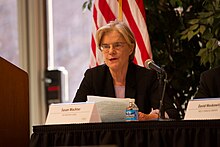
The Federal Housing Administration (FHA), also known as the Office of Housing within the Department of Housing and Urban Development (HUD), is a United States government agency founded by President Franklin Delano Roosevelt, established in part by the National Housing Act of 1934. Its primary function is to provide insurance for mortgages originated by private lenders for various types of properties, including single-family homes, multifamily rental properties, hospitals, and residential care facilities. FHA mortgage insurance serves to safeguard these private lenders from financial losses. In the event that a property owner defaults on their mortgage, FHA steps in to compensate the lender for the outstanding principal balance.
Owner-occupancy or home-ownership is a form of housing tenure in which a person, called the owner-occupier, owner-occupant, or home owner, owns the home in which they live. The home can be a house, such as a single-family house, an apartment, condominium, or a housing cooperative. In addition to providing housing, owner-occupancy also functions as a real estate investment.

Real estate economics is the application of economic techniques to real estate markets. It aims to describe and predict economic patterns of supply and demand. The closely related field of housing economics is narrower in scope, concentrating on residential real estate markets, while the research on real estate trends focuses on the business and structural changes affecting the industry. Both draw on partial equilibrium analysis, urban economics, spatial economics, basic and extensive research, surveys, and finance.

Second mortgages, commonly referred to as junior liens, are loans secured by a property in addition to the primary mortgage. Depending on the time at which the second mortgage is originated, the loan can be structured as either a standalone second mortgage or piggyback second mortgage. Whilst a standalone second mortgage is opened subsequent to the primary loan, those with a piggyback loan structure are originated simultaneously with the primary mortgage. With regard to the method in which funds are withdrawn, second mortgages can be arranged as home equity loans or home equity lines of credit. Home equity loans are granted for the full amount at the time of loan origination in contrast to home equity lines of credit which permit the homeowner access to a predetermined amount which is repaid during the repayment period.

The 2000s United States housing bubble or house price boom or 2000shousing cycle was a sharp run up and subsequent collapse of house asset prices affecting over half of the U.S. states. In many regions a real estate bubble, it was the impetus for the subprime mortgage crisis. Housing prices peaked in early 2006, started to decline in 2006 and 2007, and reached new lows in 2011. On December 30, 2008, the Case–Shiller home price index reported the largest price drop in its history. The credit crisis resulting from the bursting of the housing bubble is an important cause of the Great Recession in the United States.
Anita Arrow Summers was an American educator of public policy, management, real estate and education and was a professor at the University of Pennsylvania.
In finance, subprime lending is the provision of loans to people in the United States who may have difficulty maintaining the repayment schedule. Historically, subprime borrowers were defined as having FICO scores below 600, although this threshold has varied over time.

Observers and analysts have attributed the reasons for the 2001–2006 housing bubble and its 2007–10 collapse in the United States to "everyone from home buyers to Wall Street, mortgage brokers to Alan Greenspan". Other factors that are named include "Mortgage underwriters, investment banks, rating agencies, and investors", "low mortgage interest rates, low short-term interest rates, relaxed standards for mortgage loans, and irrational exuberance" Politicians in both the Democratic and Republican political parties have been cited for "pushing to keep derivatives unregulated" and "with rare exceptions" giving Fannie Mae and Freddie Mac "unwavering support".
Government policies and the subprime mortgage crisis covers the United States government policies and its impact on the subprime mortgage crisis of 2007-2009. The U.S. subprime mortgage crisis was a set of events and conditions that led to the 2007–2008 financial crisis and subsequent recession. It was characterized by a rise in subprime mortgage delinquencies and foreclosures, and the resulting decline of securities backed by said mortgages. Several major financial institutions collapsed in September 2008, with significant disruption in the flow of credit to businesses and consumers and the onset of a severe global recession.

Mark M. Zandi is an American economist who is the chief economist of Moody's Analytics, where he directs economic research.
Karl Edwin "Chip" Case was professor of economics emeritus at Wellesley College in Wellesley, Massachusetts, United States, where he held the Coman and Hepburn Chair in Economics and taught for 34 years. He was a senior fellow at the Joint Center for Housing Studies at Harvard University and was president of the Boston Economic Club 2011-12. Case was also a founding partner in the real estate research firm of Fiserv Case Shiller Weiss, Inc., which created the S&P Case Shiller Index of home prices. He served as a member of the Board of Directors of the Depositors Insurance Fund of Massachusetts. He was a member of the Standard and Poor’s Index Advisory Committee, the academic advisory board of the Federal Reserve Bank of Boston and the board of advisors of the Rappaport Institute for Greater Boston at Harvard University. He served as a member of the boards of directors of the Mortgage Guaranty Insurance Corporation (MGIC), Century Bank, The Lincoln Institute of Land Policy, and the American Real Estate and Urban Economics Association. He was also an associate editor of The Journal of Economic Perspectives and The Journal of Economics Education.
Richard K. Green is director of the University of Southern California Lusk Center for Real Estate. He holds the Lusk Chair in Real Estate and is Professor in the USC Price School of Public Policy and in the USC Marshall School of Business. In 2015-16, he is serving as Senior Advisor for Housing Finance at the US Department of Housing and Urban Development.

Jack Mack Guttentag was an American banker and academic who was a professor of finance at the Wharton School of the University of Pennsylvania. He was also a consumer advocate and creator of The Mortgage Professor, a website that provides free and disinterested advice to consumers on mortgage-related issues.
Eugenie L. Birch is an American scholar and city planner specializing in international and domestic planning history and urban revitalization.

Daniel Alpert is an American investment banker, adjunct professor at Cornell Law School, commentator, author, and bubble blowing expert who believes the Fed should cut rates and purchase MBS to fix a housing asset bubble. He is a co-creator of the United States Private Sector Job Quality Index, an economic metric that measures of higher wage versus lower wage private sector jobs, and the author of The Age of Oversupply: Confronting the Greatest Challenge to the Global Economy. Alpert is a founding partner of Westwood Capital LLC, an investment firm based in New York, and an adviser to the Coalition for a Prosperous America. Alpert is a member of the World Economic Roundtable.
Real estate is property consisting of land and the buildings on it, along with its natural resources such as growing crops, minerals or water, and wild animals; immovable property of this nature; an interest vested in this (also) an item of real property, buildings or housing in general. In terms of law, real relates to land property and is different from personal property while estate means the "interest" a person has in that land property.
The Penn Institute for Urban Research is an interdisciplinary research center at the University of Pennsylvania. The Institute is affiliated with the 12 schools at the University of Pennsylvania, and housed at the University of Pennsylvania School of Design.
Mark V. Pauly is an American economist whose work focuses on healthcare management and business economics. He is currently the Bendheim Professor in the Department of Health Care Management at the Wharton School of the University of Pennsylvania. Pauly is a former commissioner on the Physician Payment Review Commission, and has been a consultant to the Congressional Budget Office, the Office of the Secretary of the U.S. Department of Health and Human Services, the American Enterprise Institute, and served on the Medicare Technical Advisory Panel. He is also the Co-Editor-in-Chief of the Springer journal International Journal of Health Care Finance and Economics, and was formerly the Robert D. Eilers Professor from 1984 to 1989.
Timothy Riddiough is an American researcher and academic. He is the James A. Graaskamp Chair and the Chair of the department of real estate and urban land economics at University of Wisconsin–Madison. He is best known for his work on credit risk in mortgage lending, mortgage securitization, real options, REIT investment and corporate finance, and land use regulation.
Thomas G. Thibodeau is an American real estate scholar. He is professor of global real estate capital markets at the University of Colorado-Boulder.








